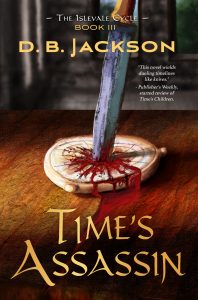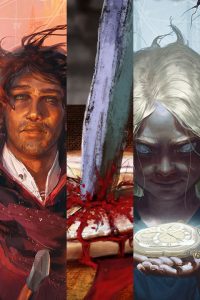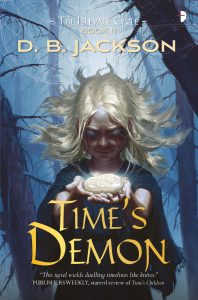 Release week continues with a special Tuesday interview post! Yes, that’s right: I am going to interview… Myself!!
Release week continues with a special Tuesday interview post! Yes, that’s right: I am going to interview… Myself!!
Today, I am pleased to welcome author D.B. Jackson to the blog. D.B. has a new novel out this week. Time’s Assassin, the third volume in his critically acclaimed Islevale Cycle, will be released on Tuesday, July 7, by Falstaff Books. (Order it here. Buy the first two books in the series at a special price here.)
David: D.B., welcome to the blog, and may I say that you are even better looking in person than you are in your pictures.
D.B.: Nice, starting right off with full-on conceited creeper. Way to hold your audience…
David: Why don’t you start by telling us about Time’s Assassin?
D.B.: Well, that’s a lazy-ass question. It’s not like you haven’t read the book….
Fine. Time’s Assassin is the concluding volume of the Islevale Cycle, my time travel, epic fantasy series. The Islevale books tell the story of Tobias Doljan and Mara Lijar, fifteen-year-old Walkers, time travelers, who go back in time to stop a war. But they’re trapped in the past and forced to protect and care for the infant daughter of an assassinated royal. The catch to all this is that time travel in my world exacts a price: For every year they go back in time, they age that amount. So they went back fourteen years, which means that they arrive in the past as twenty-nine year-olds, but with the thoughts and emotions of teenagers. They are pursued by assassins, caught up in castle intrigue, and have to match wits with a host of Ancients, as my demons are called. There’s a lot going on, and in this volume, all the story arcs come together.
David: It sounds interesting!
D.B.: Well… I’m glad you think so. If I couldn’t win you over, I was going to have a lot of trouble getting anyone else to care…
David: What made you decide to take on time travel?
 D.B.: Hubris, foolishness, self-loathing: take your pick. Time travel is so difficult. I love these books, and I’m very proud of them, but I hope never to write another time travel novel. The allure of time-travel lies in the narrative possibilities, the complications, the twists and turns. And it’s all there. But those attractions are also the biggest problems. No plot point is certain. Every event is, potentially, subject to a do-over. When we mess with time, we take away the guaranteed permanence of everything we do to and with our characters. That’s why I had to make the price of my time travel magic so steep. Because if it costs nothing to travel across time, then the time travel itself takes over the story and makes everything transitory. At least with the time travel exacting such a cost, I can limit this somewhat. And even so, once my characters made it to the past, I had to take steps to ensure that they couldn’t Walk through time again, at least for a while.
D.B.: Hubris, foolishness, self-loathing: take your pick. Time travel is so difficult. I love these books, and I’m very proud of them, but I hope never to write another time travel novel. The allure of time-travel lies in the narrative possibilities, the complications, the twists and turns. And it’s all there. But those attractions are also the biggest problems. No plot point is certain. Every event is, potentially, subject to a do-over. When we mess with time, we take away the guaranteed permanence of everything we do to and with our characters. That’s why I had to make the price of my time travel magic so steep. Because if it costs nothing to travel across time, then the time travel itself takes over the story and makes everything transitory. At least with the time travel exacting such a cost, I can limit this somewhat. And even so, once my characters made it to the past, I had to take steps to ensure that they couldn’t Walk through time again, at least for a while.
David: Islevale is yet another world of your own creation. Tell us a bit about it.
D.B.: Islevale is a world of oceans and islands, a bit like Ursula K. Le Guin’s Earthsea. The Earthsea trilogy was one of my very favorite fantasy series when I was young — it’s one of the works that inspired me to write — and so I meant the world as an homage to Le Guin and to those books.
If I had to place Islevale in a period analogous to some historical era of our world, I would probably choose the early Renaissance. That’s the technology level. And, like many fantasy worlds, Islevale is inhabited by a diverse population of humans and also by other sorts of creatures. Specifically, humans share the world with the Ancients, different races of what the humans, in their ignorance, call demons. These are magical beings with their own customs and ancient forms of commerce and culture. They were enormous fun to write.
David: So, you are actually a pseudonym. What’s that like?
D.B.: Excuse me?
David: You’re a pseudonym. A pen name. You don’t really exist. You’re just the alter ego of a real, well-established author. So I’m just wondering—
D.B.: I knew you were going to do this.
David: What?
D.B.: You know what. Pulling the whole “I’m real, you’re not” thing. That is so typical of you corporeal types. You think our readers give a flying fart about which one of us is “real”?
David: Just for the record, I am.
D.B.: I know! But what I’m saying is, it doesn’t matter. We share a newsletter and a Facebook page—
David: Maintained by yours truly.
D.B.: —And a lot of our audience likes books by both of us. Moreover, Mister Real Guy, I’d be careful about who you call the “real established author.” Would you care to compare reviews?
David: [Clearing throat] Why don’t you tell us what you’re working on now?
D.B.: Yeah, I thought so.
 I’ve just finished working on a set of three novellas set in the Thieftaker universe. These will be released one at a time in ebook format later this year, and then the three together will be published in a printed omnibus. And, speaking of Thieftaker, our agent and I have recently gotten back the rights to the third and fourth Thieftaker novels, A Plunder of Souls and Dead Man’s Reach, which had been hard to find. We will be re-issuing these in trade paperback later this year or early next year.
I’ve just finished working on a set of three novellas set in the Thieftaker universe. These will be released one at a time in ebook format later this year, and then the three together will be published in a printed omnibus. And, speaking of Thieftaker, our agent and I have recently gotten back the rights to the third and fourth Thieftaker novels, A Plunder of Souls and Dead Man’s Reach, which had been hard to find. We will be re-issuing these in trade paperback later this year or early next year.
David: Well, that sounds great. I wish you — us, really — every success with Time’s Assassin and the rest of the Islevale books, as well as with the upcoming Thieftaker releases. Best of luck to you.
D.B.: Thank you. And to you. [Sotto voce] Pinhead…














 As you know at this point, we are in the midst of release week for
As you know at this point, we are in the midst of release week for  The truth is, I have felt that way about all three volumes of this trilogy. The Islevale books were incredibly difficult to write. I knew going in that writing time travel would be really hard — as one friend told me, “It’ll make your brain explode.” So much can go wrong. We have to examine every plot point from every possible angle to make certain it holds up to logic, and to the simple reality that time travel gives us endless opportunities for do-overs. Put another way, every event in a time travel story is negotiable. Each one can be altered or reversed by the very plot devices on which our stories depend.
The truth is, I have felt that way about all three volumes of this trilogy. The Islevale books were incredibly difficult to write. I knew going in that writing time travel would be really hard — as one friend told me, “It’ll make your brain explode.” So much can go wrong. We have to examine every plot point from every possible angle to make certain it holds up to logic, and to the simple reality that time travel gives us endless opportunities for do-overs. Put another way, every event in a time travel story is negotiable. Each one can be altered or reversed by the very plot devices on which our stories depend. I hoped that
I hoped that  I frequently tell beginning writers that they need to self-define success, something which is really hard to do in this business. All too often we writers are forced by the nature of publishing to seek exterior affirmation for our work — reviews, sales, awards if we’re fortunate enough to win them. These are the things the industry values and so, naturally, they are the things we care about as well. The problem with this is, the industry is cruel and capricious. We all know of good, even great, books that go unnoticed and unacknowledged. We all have seen mediocrity rewarded with terrific sales and undeserved attention. And we know that this is true in the world beyond publishing as well. Life is not always fair.
I frequently tell beginning writers that they need to self-define success, something which is really hard to do in this business. All too often we writers are forced by the nature of publishing to seek exterior affirmation for our work — reviews, sales, awards if we’re fortunate enough to win them. These are the things the industry values and so, naturally, they are the things we care about as well. The problem with this is, the industry is cruel and capricious. We all know of good, even great, books that go unnoticed and unacknowledged. We all have seen mediocrity rewarded with terrific sales and undeserved attention. And we know that this is true in the world beyond publishing as well. Life is not always fair. I’ve just finished working on a set of three novellas set in the
I’ve just finished working on a set of three novellas set in the  …And allow me take a moment to urge you get a copy of Time’s Assassin. (
…And allow me take a moment to urge you get a copy of Time’s Assassin. (